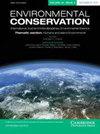卫生是户外猫管理中最关心的问题,但生态信息框架促进了日本的生物多样性保护
IF 2.6
3区 环境科学与生态学
Q2 BIODIVERSITY CONSERVATION
引用次数: 1
摘要
信息框架有助于增加公众对入侵物种管理的支持。然而,在不同的背景下,人们对入侵物种管理的挑战和利益的多重目标管理的偏好知之甚少。本研究通过实验控制信息和最佳-最差尺度技术,在三种情境框架下研究了日本公民对自由漫游无主猫(Felis catus)管理目标的偏好。研究结果表明,强调无主流浪猫对本地生态系统的生态影响的生态框架显著增加了日本公民对猫捕食的关注,尽管该框架没有改变目标的偏好排名。根据猫的所有权,信息框架的效果是不同的。从“最佳最差尺度法”可以看出,日本人更喜欢保持环境卫生,其次是预防人畜共患疾病。虽然卫生环境管理的排名不依赖于养猫,但其他目标的排名因养猫而异。研究结果强调了战略信息框架及其在鼓励公众支持入侵物种管理方面的重要性。本文章由计算机程序翻译,如有差异,请以英文原文为准。
Sanitation is the greatest concern in outdoor cat management but ecological message frames promote biodiversity conservation in Japan
Summary Message framing contributes to an increase in public support for invasive species management. However, little is known about people’s preferences for the multiple objectives of management within different contexts relating to the challenges and benefits of invasive species management. We examine Japanese citizens’ preferences for the goals of free-roaming unowned cat (Felis catus) management in three contextual frames by applying experimentally controlled information and the best–worst scaling technique. Our results indicate that the ecological frame highlighting the ecological impacts of free-roaming unowned cats on native ecosystems significantly increases Japanese citizens’ concern about cat predation, although the frame did not change the preference ranking of goals. There are differences in the effects of message framing depending on cat ownership. The best–worst scaling technique shows that Japanese citizens prefer to maintain a sanitary environment, followed by the prevention of zoonotic diseases. Although the ranking of sanitary environmental management does not depend on cat ownership, the ranking of the other goals differs depending on cat ownership. The findings highlight the importance of strategic message framing and its prioritization in encouraging public support for invasive species management.
求助全文
通过发布文献求助,成功后即可免费获取论文全文。
去求助
来源期刊

Environmental Conservation
环境科学-环境科学
CiteScore
5.20
自引率
3.70%
发文量
43
审稿时长
>36 weeks
期刊介绍:
Environmental Conservation is one of the longest-standing, most highly-cited of the interdisciplinary environmental science journals. It includes research papers, reports, comments, subject reviews, and book reviews addressing environmental policy, practice, and natural and social science of environmental concern at the global level, informed by rigorous local level case studies. The journal"s scope is very broad, including issues in human institutions, ecosystem change, resource utilisation, terrestrial biomes, aquatic systems, and coastal and land use management. Environmental Conservation is essential reading for all environmentalists, managers, consultants, agency workers and scientists wishing to keep abreast of current developments in environmental science.
 求助内容:
求助内容: 应助结果提醒方式:
应助结果提醒方式:


